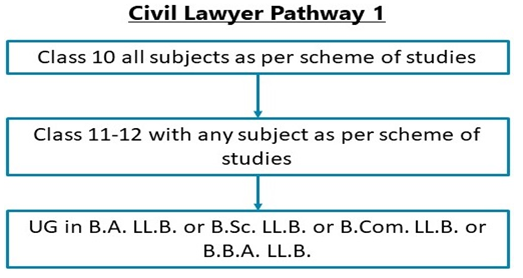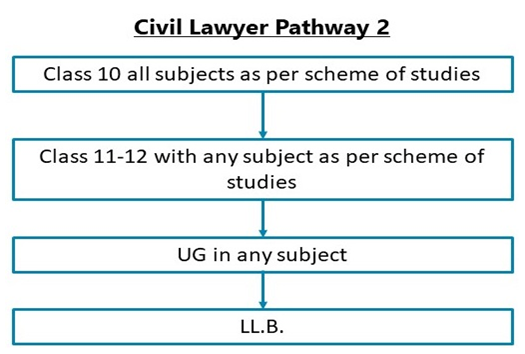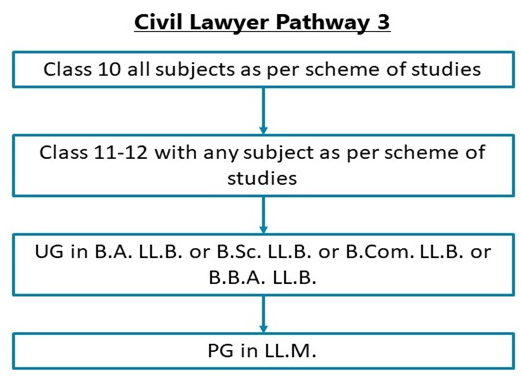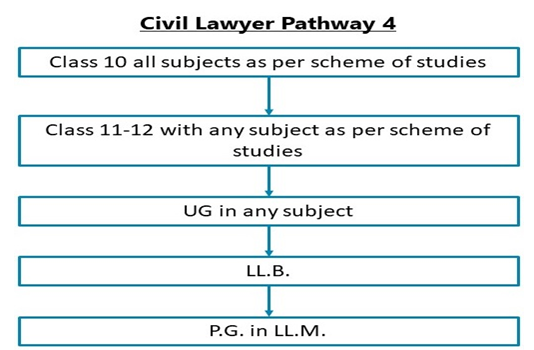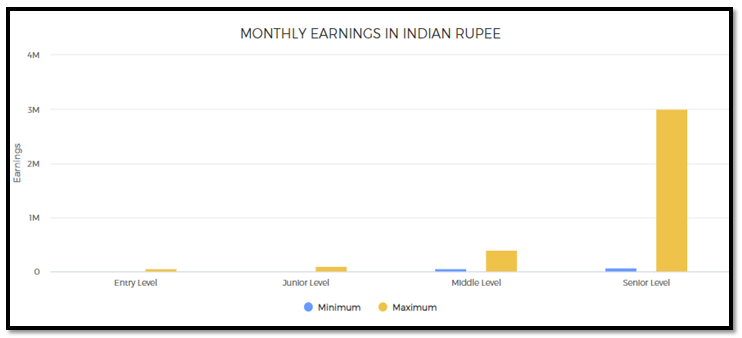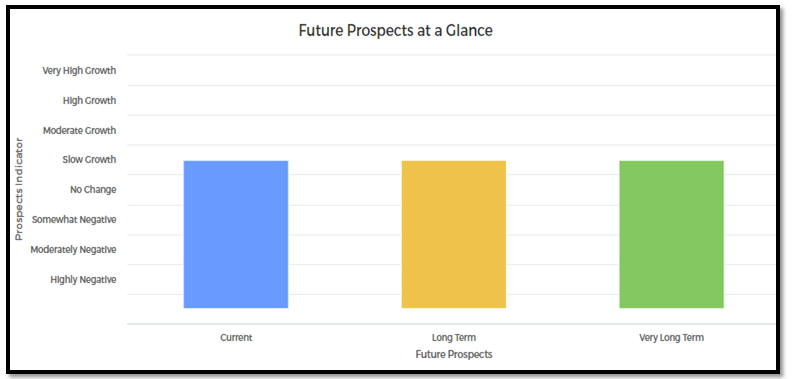Civil Lawyer
Entry Level Qualification
12
Career Fields
Legal Services
For Specially Abled






About Career
A Civil Lawyer is a lawyer who works for the civil rights of citizens. As a Civil Lawyer, you work on behalf of your client which can be an individual, group, or businesses to protect their interest on various aspects like contracts, family matters, recovery of money or property, discrimination on gender, race, employment, social freedom, etc.As a civil lawyer, you will handle civil legal matters on behalf of your clients and try to reduce the expenses of your client which they have to pay due to a civil lawsuit.
However, it must be noted that a civil lawyer doesn’t handle the criminal issues; you represent your client who is seeking for settling the non-criminal disputes. Civil Lawyers file their client’s cases in civil courtsandwhen required; present their clients’ cases before the judges of the civil courts. A civil lawyer works for various cases which involve contract laws, family laws, commercial laws, human rights laws, employment laws, etc.
Key roles and responsibilities
As a civil lawyer, you to have to fulfill the following roles and responsibilities.
1. You will investigate your client’s affairs, counsel their legal rights to ensure they have operated under the law and then proceed with their cases.
2. You must ensure that your client receive fair and equal justice in a court of law.
3. As a civil lawyer, you will conduct legal and referencing work, draft legal documents, prepare for filing of litigations, argue the cases in courts and negotiate settlements between parties.
4. As a civil lawyer, you will advise your client on legal matters and communicate with their needs.
5. Whenever there is any change in the law as a civil lawyer, you will interpret the legal information and inform your clients.
6. You will present cases of your clients in courts before judges, both in writing and verbally.
7. You will conduct all the legal proceedings and communicate the outcomes to your clients.
8. As a civil lawyer, you will provide legal support on contractual matters, drafting notices and legal issues.
9. As a civil lawyer, you will provide legal protection and risk management advice to the various concerned departments of the company.
PARTICULARS | DESCRIPTION |
Name | Civil Lawyer |
Purpose | Handle Non-Criminal Legal Matters |
Career Field | Legal Services |
Required Entrance Exam | CLAT UG, CLAT PG |
Average Salary | 60000 - 200000 Rs. Per Year |
Companies For You | AZB & Partners, Shardul Amarchand Mangaldas & Many More |
Who is Eligible | Class 12th PASS |
Career Entry Pathway
Class 10 all subjects as per scheme of studies – Class 11-12 with any subject as per scheme of studies – UG in B.A. LL.B. or B.Sc. LL.B. or B.Com. LL.B. or B.B.A. LL.B.
After your Class 10 all subjects as per scheme of studies, you can study Class 11-12 with any subject as per scheme of studies. Then you can give a law entrance exam like CLAT (common law aptitude test) and join an integrated 5 years’ course of B.A. LL.B. or B.Com. LL.B. or B.Sc. LL.B. or B.B.A. LL.B. from any law school. After your graduation, to practice law in India, you have to register yourself with a State Bar Council and then qualify in the All India Bar Examination (AIBE) conducted by the Bar Council of India.
Class 10 all subjects as per scheme of studies – Class 11-12 with any subject as per scheme of studies - UG in any subject – LL.B.
After your Class 10 all subjects as per scheme of studies, you can study Class 11-12 with any subject as per scheme of studies. Then you can study any subject in any stream to complete your under-graduation course. After your graduation, you can do a LL.B. After your graduation, to practice law in India, you have to register yourself with a State Bar Council and then qualify in the All India Bar Examination (AIBE) conducted by the Bar Council of India.
Class 10 all subjects as per scheme of studies – Class 11-12 with any subject as per scheme of studies – UG in B.A. LL.B. or B.Sc. LL.B. or B.Com. LL.B. or B.B.A. LL.B. – PG in LL.M.
After your Class 10 all subjects as per scheme of studies, you can study Class 11-12 with any subject as per scheme of studies. Then you can give a law entrance exam like CLAT (common law aptitude test) and you can join an integrated 5 years’ course of B.A. LL.B. or B.Com. LL.B. or B.Sc. LL.B. or B.B.A. LL.B. from any law school. After your graduation, to practice law in India, you have to register yourself with a State Bar Council and then qualify in the All India Bar Examination (AIBE) conducted by the Bar Council of India. Then you can do a LL.M. with a specialisation in a field of Civil Law.
Class 10 all subjects as per scheme of studies – Class 11-12 with any subject as per scheme of studies – UG in any subject – LL.B. – P.G. in LL.M
After your Class 10 all subjects as per scheme of studies, you can study Class 11-12 with any subject as per scheme of studies. Then you can study any subject in any stream to complete your under-graduation course. After your graduation, you can do a LL.B. After your graduation, to practice law in India, you have to register yourself with a State Bar Council and then qualify in the All India Bar Examination (AIBE) conducted by the Bar Council of India. Then you can do a LL.M. with a specialisation in a field of Civil Law.
Required Qualification & Competencies
You can do a Bachelor’s degree in Law either directly after your Class 11-12 with any subject as per scheme of studies r after your graduation. Most reputed law colleges offer a 5-year integrated B.A./B.Sc./B.Com./B.B.A. LL.B. degree. After graduation in any subject, you can do a 3-year LL.B.
After your Bachelor’s degree, you may opt to do an LL.M. in Civil Law or in a related field.
MINIMUM EDUCATION REQUIRED | MAXIMUM EDUCATION REQUIRED |
Under Graduate | Post Graduate |
COMPETENCIES REQUIRED
Interests
1. Enterprising: You should have interests for Enterprising Occupations. Enterprising occupations involve taking initiatives, initiating actions, and planning to achieve goals, often business goals. These involve gathering resources and leading people to get things done. These require decision making, risk-taking and action orientation.
2. Investigative: You should have interests for Investigative Occupations. Investigative occupations involve working with ideas and quite a lot of thinking, often abstract or conceptual thinking. These involve learning about facts and figures; involve use of data analysis, assessment of situations, decision making and problem-solving.
Abilities
1. Abstract Reasoning: The ability to understand ideas which are not expressed in words or numbers; the ability to understand concepts which are not clearly expressed verbally or otherwise.
2. Articulation: The ability to speak clearly so others can understand you.
3. Deductive Reasoning: The ability to apply general rules and common logic to specific problems to produce answers that are logical and make sense. For example, understanding the reasons behind an event or a situation using general rules and common logic.
4. Inductive Reasoning: The ability to combine pieces of information from various sources, concepts, and theories to form general rules or conclusions. For example, analysing various events or situations to come out with a set of rules or conclusions.
5. Memorization: The ability to remember information such as words, numbers, pictures, and procedures.
6. Mental Stamina: The ability to sustain prolonged mental effort.
7. Oral Comprehension: The ability to listen to and understand information and ideas presented through spoken words and sentences.
8. Oral Expression: The ability to communicate information and ideas in speaking so others will understand.
9. Perceptual Speed: The ability to quickly and accurately compare similarities and differences among sets of letters, numbers, objects, pictures, or patterns. The things to be compared may be presented at the same time or one after the other. This ability also includes comparing a presented object with a remembered object.
10. Problem Sensitivity: The ability to tell when something is wrong or is likely to go wrong. It does not involve solving the problem, only recognizing there is a problem.
11. Selective Attention: The ability to concentrate on a task over a long period of time without being distracted.
12. Speed of Closure: The ability to quickly make sense of, combine, and organize information into meaningful patterns.
13. Verbal Reasoning: The ability to think and reason with words; the ability to reason out ideas expressed in words.
14. Written Comprehension: The ability to read and understand information and ideas presented in writing.
15. Written Expression: The ability to communicate information and ideas in writing so others will understand.
Knowledge
1. English Language: Knowledge about English grammar, words, spelling, sentence construction, using English to communicate with others, reading in English, etc.
2. Law: Knowledge of laws, legal codes, legal procedures, regulations, Government orders, etc.
Skills
1. Active Learning: Focused and continuous learning from various sources of information, observation and otherwise for application in getting work done.
2. Active Listening: Giving full attention to what other people are saying, understanding the points being made by others, asking questions, etc.
3. Communication in English: Skills in communicating effectively in writing as well as verbally with others in English language.
4. Critical Thinking: Skills in analysis of complex situations, using of logic and reasoning to understand the situations and take appropriate actions or make interpretations and inferences.
5. Judgment and Decision Making: Skills in considering pros and cons of various decision alternatives; considering costs and benefits; taking appropriate and suitable decisions.
6. Negotiation: Skills in bringing others together and trying to reconcile differences.
7. Problem Solving: Skills in analysis and understanding of problems, evaluating various options to solve the problems and using the best option to solve the problems.
8. Public Speaking: Talking effectively to a large group of people or an audience or addressing public at large in different settings such as conferences, seminars, meetings, etc.
9. Reading Comprehension: Skills in understanding written sentences and paragraphs in work related documents.
10. Writing: Skills in communicating effectively in writing as appropriate for the needs of the readers.
Personality
1. You are always or mostly organised in your day-to-day life and activities.
2. You are always or mostly careful about your actions and behavior.
3. You are always or mostly disciplined in your action and behavior.
4. You are always calm or generally remain calm in most situations.
5. You can always act independently or could do so in most situations.
6. You are helpful to others sometimes.
7. You don't trust others easily.
8. You are always practical or in most situations.
9. You are always or mostly dependent on others or on set rules and procedures.
Career - Job Opportunities & Profiles
After you graduate with a law degree, you can get a job with:
1. A senior practising lawyer and work as a Junior, helping him preparing case files, research, presentation, filing cases in courts, etc.
2. A law firm or a Solicitor’s firm (there is no difference as such) as a Junior Solicitor or similar position. Here as well, you will assist senior lawyers in preparing case files, research, presentation, filing cases in courts, etc.
3. A management consulting or financial consulting firm which has legal practices. Here also you will work to assist senior lawyers.
4. Many corporate and other organizations have legal departments. You can be recruited in these departments as a Junior Lawyer.
5. You may join defence forces and governments in legal functions or departments.
To practice independently or on behalf of a firm, company or other organisations, you need to register with a State Bar Council and then appear and qualify in the All India Bar Examination (AIBE) conducted by the Bar Council of India. Independent practice is advisable only after having 8-10 years of experience under a senior lawyer or with a firm.
Work environment
Majority of lawyers work full time as their job involves various aspects like conducting research, drafting documents etc. so they often work for long hours. A civil lawyer works in offices but mostly they have to travel at various locations to conduct meetings with their clients and for gathering information. Lawyers who represent their clients in court may face heavy pressure during trials. So, the job is very hectic as sometimes they have to meet the deadlines.
CAREER GROWTH
It all depends on your work of experience and qualification.
1. If you hired as a junior lawyer in a law firm or a consulting firm, then you will move up the organization as a practicing lawyer/associate consultant (after having cleared the AIBE examination and after having 5-8 years of experience) and then become a senior lawyer/consultant. In law firms, you can move up to the level of a Partner.
2. Incorporate and other organizations, you can move from a junior legal officer to a legal officer and then a senior legal officer. Then you can be a GM/Associate Vice President-Legal and finally a Vice President/President – Legal and Corporate Affairs.
Salary Offered
1. As a junior to a senior practicing lawyer, you may earn about Rs. 5,000 – 15,000 or more per month at the beginning. After 5-10 years, you may make Rs. 15,000-40,000 a month.
2. At a law firm or a Solicitor’s firm, at the beginning you will make about Rs. 8,000 – 20,000 or more per month. After 5-10 years, you may make Rs. 15,000-60,000 a month.
3. At a management consulting or financial consulting firm, you may get about Rs. 30,000-50,000 or even more per month in the beginning. After 5-10 years, you may make Rs. 45,000-2,00,000 a month.
4. At corporate and other organizations’ legal departments, you can earn about Rs. 25,000-40,000 a month in the beginning and then Rs. 40,000-1,50,000 or more a month after 5-10 years.
5. With defence and government services, you may make about Rs. 65,000-70,000 a month at the beginning and then 1,20,000-1,40,000 a month in 5-8 years and about Rs. 2,40,000 a month after 15-18 years.
6. If you practice independently after having spent 8-10 or more years with a senior lawyer or a firm, you may earn Rs. 25,000 – 1,00,000 or more per month. After 15-20 years, you can make anything between Rs. 1,00,000 – 2,00,00,000 or even more per month.
MONTHLY EARNINGS IN INDIAN RUPEE
1. Entry level: 0 - 2 years of work experience
2. Junior Level: From 1 to 12 years of work experience
3. Mid-Level: From 5 to 20+ years of work experience
4. Senior Level: From 10 to 25+ years of work experience (there could be exceptions in some high-end technical, financial, engineering, creative, management, sports, and other careers; also in the near future, people will reach these levels much faster in many careers and in some careers, these levels will have no meaning as those careers will be completely tech skill driven such as even now, there is almost no level in a Cyber Security Expert’s job)
Work Activities
1. Addressing grievances and resolving conflicts: Handling complaints and grievance to resolve; resolving conflicts among co-workers or others at the workplace or outside in relation to your work.
2. Analysing and interpreting data and information: Analysis of data and information to find facts, trends, reasons behind situations, etc.; interpretation of data to aid in decision making.
3. Assessing and determining compliance with standards, laws, rules and guidelines: Using relevant information, auditing information, processes and systems to determine whether organizations or people are complying with standards, laws, rules and guidelines.
4. Communicating with co-workers and others: Communicating with people in writing, verbally or otherwise inside your workplace and various other people who have professional relationships with your place of work including vendors, government officials, etc. or with people at large.
5. Decision making and problem solving: Analysis of data and information; evaluation of alternative decisions and results of decisions; taking the right decisions and solving problems.
6. Getting Information and learning: Observing, hearing, reading, using computers, or otherwise obtaining information and learning from it.
7. Inspecting situations, events: Inspecting situations, events people and people to understand the reasons and causes for the situation or events to happen; inspecting people to understand reasons behind their behavior and actions.
8. Organizing, planning and prioritizing tasks: Planning and organising tasks in order to achieve work goals; prioritizing tasks to achieve goals and making the best use of the time available.
9. Providing advice and consultation to others: Giving advice or consultation to others about various issues, conceptual matters, know-how, scientific matters, products or services.
10. Updating and using relevant knowledge: Keeping updated with the latest knowledge relevant to your fields of work and use of the relevant knowledge in getting things done.
11. Using computers for work: Using computers for day-to-day office work; using computer software for various applications in day-to-day professional work; entering data and process information; for writing.
Future Prospects
The demand for lawyers is expected to continue as individuals, businesses, and government require legal services in many areas. There are several reasons why civil lawyers will have a bright future ahead. Overall education level in India has grown; this implies people are more aware of their rights, especially women. Thus, civil harassments are likely to end up in the court rather than in house settlement.
Further, the government is making people more aware of their rights. Also, more people are open to file civil lawsuits. Thus, there is a good opportunity for civil lawyers in future.
FUTURE PROSPECTS AT A GLANCE


